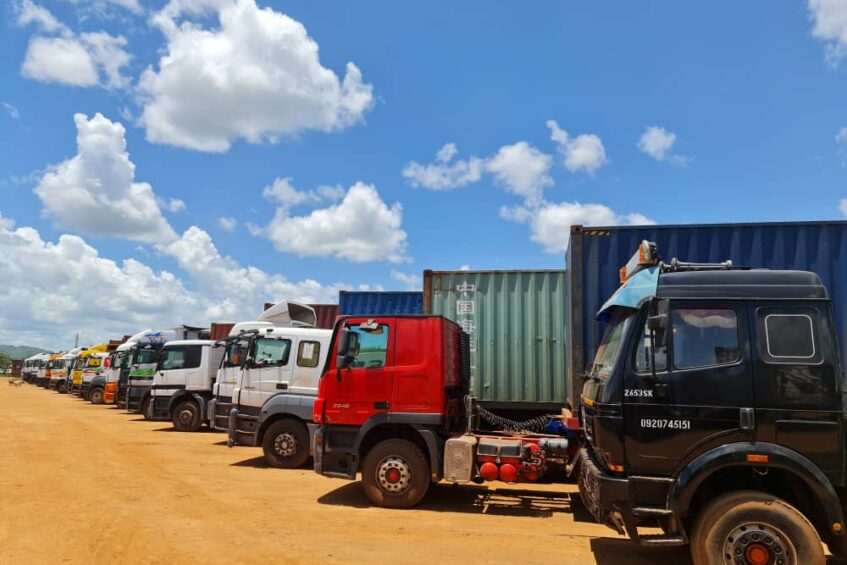
Trucks at the Nimule Customs yard | Credit | Deng Daniel
South Sudan and Uganda bureau of standards have resolved to jointly clamp down on cross-border trade in counterfeit goods by ensuring better standard and quality of their respective exports.
This was in a Joint Meeting held in Nimule between the South Sudan National Bureau of Standards (SSNBS) and the Uganda National Bureau of Standards (UNBS) on issues affecting transboundary trade.
The meeting was co-chaired by Dr. Kuorwel Kuai Kuorwel, the Chairperson of the South Sudan Bureau of Standards and Mr. Nangalama Daniel Richard Makayi, Acting Executive Director of Uganda Bureau of Standard.
According to SSNBS press statement, the meeting discussed Standards and Quality related issues on cereals mainly maize, and the issue of certification and laboratory analysis of the maize flour.
The meeting also discussed the quality of other perishable goods including fruits and vegetables, dairy products, chicken and chicken products.
On the other hand, the officials discussed certification of South Sudan products such as preserved fish products and Teak logs.
In the resolutions, the two governments agreed that cereal and cereal products, mainly maize flour. from the Republic of Uganda must be accompanied with certification permit from the UNBS.
South Sudan also requested that other products such as fruits and vegetables, dairy products (fresh milk and yoghurts), chicken and chicken products, fish and fish products must be accompanied with the SPS certificate from the SPS Competent Authorities in Uganda.
Nonetheless, SSNBS to officially communicate issues related to SPS requirements to the Competent Authorities.
Finally, the two National Standards bodies have agreed to set up the Technical Team to harmonise sampling, test methods and certification processes.
The technical collaboration team will start immediately and present their report within a month in a meeting that will be convened at Elegu, Uganda.
The two National Standards bodies have agreed to revert back to the EAC Standardization, Quality assurance, Metrology and Testing arrangements after receiving the Report of the Joint Technical Team.
– Export to South Sudan only –
SSNBS said it has noted that some traders import goods outside the EAC region and re-package them in Uganda to which they are imported to South Sudan.
The South Sudan bureau of standards further demanded answers about some products made from Uganda and being labelled as” For Export to South Sudan only”.
“The meeting resolved that products that do not originate from Uganda and are re-packaged in Uganda shall be subjected to reshipment of verification of conformity requirement,” said SSNBS in a statement.
It further emphasized that timely sharing of information on re-packaged goods is encouraged.
The meeting resolved that the labelling should be changed to “for Exports only”, and UNBS agreed that it will share the concern of SSNBS with other agencies on the matter.
SSNBS said it will submit the list of companies that labelled goods to “Export to South Sudan” to UNBS so it is coordinated with other stakeholders and those companies; and
The SSNBS further noted that certain products are often exported from South Sudan to Uganda and other parts of the world, and which do not pass through South Sudan National Bureau of Standards.
It encouraged Uganda to coordinate crackdown on such exports by demanding certification or relevant documents from relevant authorities in South Sudan, which the later obliged.
In May 2023, South Sudan Bureau of Standards impounded 62 Uganda trucks loaded with maize grains after a lab test found the items contained dangerous chemicals.
A South Sudanese clearance official at the Nimule border point said samples from the shipment were confirmed with high aflatoxin after the grains were subjected to several laboratory tests by the South Sudan National Bureau of Standards.
Aflatoxin is a naturally occurring toxin produced by certain mold species that can contaminate crops and pose health risks to humans and animals if consumed.
Uganda protested the impounding of its goods and questioned the credibility of the test carried out in South Sudan.
However, an independent test carried out by regional experts showed that the maize products previously rejected by South Sudan have an above-normal level of the aflatoxin chemical.
Kampala then agreed to destroy tons of the locally produced maize consignments.
Support Eye Radio, the first independent radio broadcaster of news, information & entertainment in South Sudan.
Make a monthly or a one off contribution.
Copyright 2024. All rights reserved. Eye Radio is a product of Eye Media Limited.